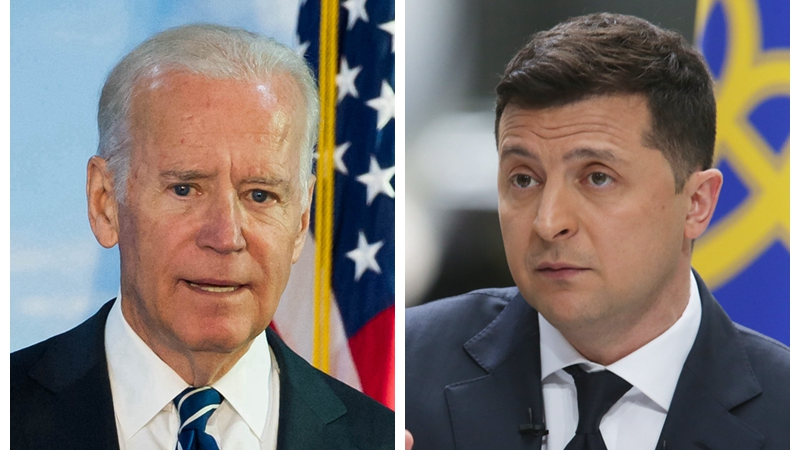
Photos of U.S. President Joe Biden (L) and Ukrainian President Volodymyr Zelensky. /Xinhua
Photos of U.S. President Joe Biden (L) and Ukrainian President Volodymyr Zelensky. /Xinhua
Editor's note: Hayat Bangash is a Pakistani freelance columnist on international affairs with degrees in business administration and war studies. The article reflects the author's opinions and not necessarily the views of CGTN.
"Don't shout so much," said Ukraine's head of security council Oleksii Danilov last month over the growing rhetoric by the U.S. on the Russia-Ukraine crisis. The shouting, in the form of repetitive warnings that Russia is about to invade Ukraine, has been doing more harm than good to the country that the U.S. is purporting to care for.
To take stock of Russia's supposed threat, it must first be understood why the situation has deteriorated. Russia has been repeatedly asserting that NATO's activities are detrimental to its border security. NATO, on the other hand, wants its security concerns addressed but is not willing to address those of Russia.
The main source of contention remains NATO's eastward expansion in what Russia says is a shameless violation of the West's promises. In addition, NATO is transcending its mandate by undertaking activities beyond its member states.
The deployment of Russian forces – whatever their number may be – is well within the borders of Russia. Not to mention the statements of Russian representatives to the UN and the EU that Russia has no plans to invade Ukraine – a view that French President Emmanuel Macron also shares.
But that has not stopped the Joe Biden administration from rolling back its rhetoric and activities. American military equipment is flowing into Ukraine, and 3,000 additional American troops are heading to Poland in the coming days.
What is important to note is that even though Ukrainian officials are not refusing the equipment, they have flatly told the U.S. to stop blowing the problem out of proportion. No less than Ukrainian President Volodymyr Zelensky had to step forward and contend that the talk of war is a mistake.
Then there is another country exacerbating the predicament while trying to find its lost space on the world stage: the UK. The United Kingdom has mainly remained irrelevant in geopolitical developments ever since it decided to join the EU and then leave it.
When the UK unexpectedly made its share of accusations against Russia last month, it initially appeared that the jingoism was a ploy to divert attention from the partygate scandal of Prime Minister Boris Johnson. But the country's yearning to regain its lost imperial glory is making it an unwelcome voice in affairs like the Russia-Ukraine standoff. Of course, there is a reason it is kept out of the Normandy Format talks that comprise France, Germany, Ukraine and Russia.
The U.S. and UK are beating war drums while not even considering the ramifications for Ukraine. It is being treated as a tool rather than a country of about 44 million people. "We are not a political football," was the remark by Alyona Getmanchuk, the director of the New Europe Center think tank in a New York Times op-ed on the unhelpful approach of the West.
By ratcheting up the drama, the so-called friends of Ukraine are delivering a very undesirable message for the expatriate talent, investors and the Ukrainian economy. Consequently, the currency is nosediving, Ukrainian bonds are being unloaded, and the government and businesses are finding it hard to borrow money on international markets.

Ukrainian Armed Forces' self-propelled multiple rocket launcher systems during drills in the Kherson region, Ukraine, in this handout picture released on February 1, 2022. /Reuters
Ukrainian Armed Forces' self-propelled multiple rocket launcher systems during drills in the Kherson region, Ukraine, in this handout picture released on February 1, 2022. /Reuters
Diplomats are generally not the first to leave a crisis zone. But the departure of many American and British diplomatic staff from Ukraine is a tactic to pressure Russia at the cost of Ukraine. U.S. foreign policy has already been militarized enough, as is evident from the fact that President Biden has not named an ambassador to Ukraine since coming to office.
The implications of American hyperbole do not stop in Ukraine. That is why Europe is treading carefully here. Despite the trade and energy dynamics of Europe and Russia being tightly integrated, the U.S. is pressuring Germany to abandon the Nord Stream 2, an important Russian natural gas pipeline to Germany. German Chancellor Olaf Scholz has avoided mentioning any impediment to Nord Stream 2, revealing that Europe is not fully appreciative of how the U.S. is handling the situation.
This exploitative American attitude reflects what is happening in other strategic engagements involving the U.S. At the Quad and AUKUS, the U.S. is pushing other countries to face its perceived rivals, whereas it remains moated in the safety of two oceans.
The resurgence of such a proxy mindset that prevailed in the various conflicts of the Cold War is dangerous. It devastates the countries in which the proxy wars are fought. Meanwhile, the U.S. remains unscathed. According to a New York Times report, plans are already afoot in the Biden administration to back an insurgency in Ukraine.
The U.S. must listen to Ukraine before destroying it in the name of providing any unwanted support. Ukraine has a far better understanding of the context and does not need to be told where its interests lie.
"I cannot be like other politicians who are grateful to the United States just for being the United States," President Zelensky said last month of the way the U.S. is supporting his country.
(If you want to contribute and have specific expertise, please contact us at opinions@cgtn.com.)

